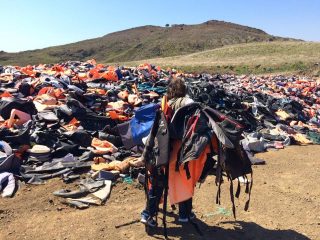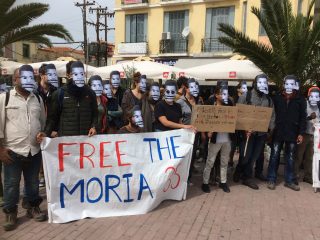Refugees in the Shadow of Brexit
The plight of Syrian refugees trapped in Greece has been largely forgotten in the UK, where all eyes are on parliament and the collapsing government of Theresa May, as the Brexit drama escalates in a crescendo of anger and irreconcilable positions.
The public is bitterly divided between Brexiteers, Remainers, and those who just want the issue to go away. What a lot of us could agree on, however, is that the domination of our politics by the Brexit debate has resulted in the abject neglect of a number of very pressing issues. People who feel this are generally thinking of the NHS, elderly care, climate change, the housing crisis, schools. These issues are of crucial importance to ordinary UK citizens; but we should also try to remember the refugees, many of whom are women and children, still suffering acutely on Europe’s borders. Our country may be about to depart from the EU; but our government supported the EU-Turkey deal of 2016, which put a vigorous brake on the numbers of Syrians making it to Greece; and our government refused to participate in the Relocation scheme, under which consenting European countries welcomed agreed numbers of refugees. (All the UK agreed to do, under David Cameron, was to accept 20,000 Syrians over five years from 2015 – 2020 under the Syria Vulnerable Person Resettlement Scheme).
Although the issue is rarely covered in the media these days, Syrian, Iraqi, Afghan and other refugees have continued to arrive in Greece this year, a few by land and the vast majority by sea. The latter risk their lives on inflatable dinghies and, if they are not turned back by the Turkish coastguard, disembark in the eastern Greek islands (principally Lesbos, Chios,Samos, Leros, Kos Rhodes and Kastellorizo). Up to 2 December, 29,784 have arrived in Greece by sea[1], while another 36,000 were turned back by the Turkish Coast Guard[2]. The vast majority of those who make it across the sea are then prohibited from leaving the island in question, and have to endure up to two years of uncertainty whilst their asylum claims are processed.
Two years on a Greek island might sound appealing to those of enduring the poisonous politics of Brexit Britain; but life for asylum seekers on the islands is extremely difficult. In Lesbos, which currently has 9,000 asylum seekers, a full two thousand will endure the winter in flimsy tents. (In the winter of 2016-2017, several asylum seekers died of cold in Lesbos due to living in tents.) The main ‘reception centre’ is the notorious Moria camp, originally constructed as an army facility able to accommodate 2,000 at most; it now houses around 7,000. Medical care is very poor; psychological care, for the many refugees who arrive in a traumatised state having just fled extreme political violence, is virtually non-existent. Overcrowding and frustration with bureaucratic delays leads to an atmosphere of high tension in the camp, which sometimes erupts into violence. When it does, unaccompanied children and single women are the most vulnerable. But even when the camp is relatively calm, sexual assault is a major problem, with the result that women are often afraid to go to the toilet blocks at night due to the risk of attack.
Most of the big NGOs have left the Greek islands. Refugees depend for physical, psychological and moral support on small NGOs such as Lesbos Solidarity, which runs a small, independent camp for the most vulnerable at Pikpa and a community centre in Mytilini (https://www.lesvossolidarity.org/en); and One Happy Family, which runs a thriving community centre close to Moria camp (https://ohf-lesvos.org/en/about/). They both operate on shoe-strings and depend on the generosity of the public for their funding.
If you wish to learn more about the refugee crisis in Greece and the war in Syria, my book Hara Hotel: A Tale of Syrian Refugees in Greece is on offer at £8.50 if bought directly from the publisher before 1 January 2019. Follow the link: https://www.versobooks.com/search?q=Hara+Hotel
Image thanks to Lesbos Solidarity
[1] Figure from UNHCR Data Portal, Greece, accessed on 9.12.18
[2] Figure from One Happy Family newsletter, December 2018

